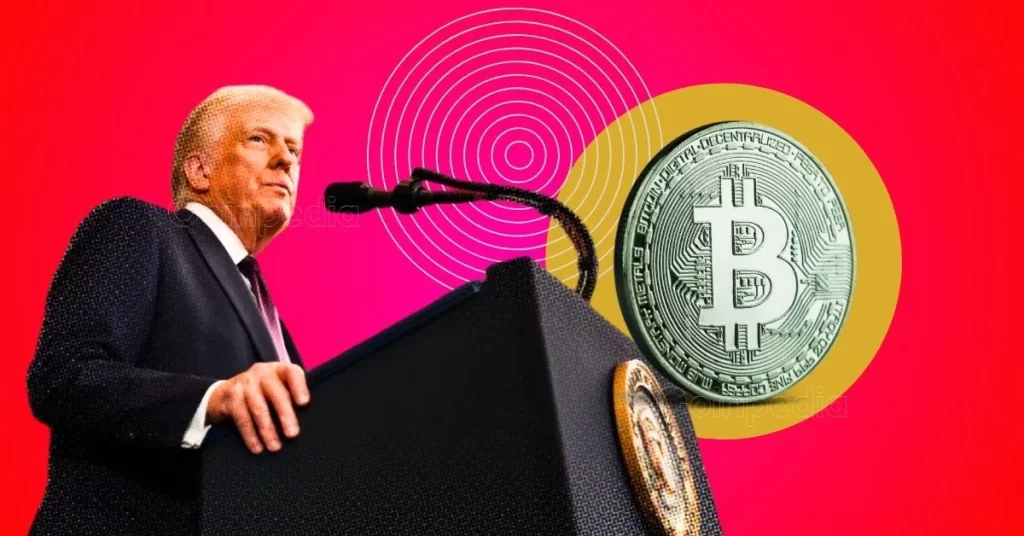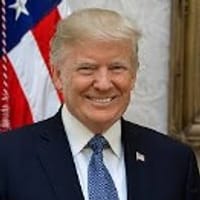
The post The National Digital Asset Stockpile: How Donald Trump Plans to Build a Bitcoin Reserve appeared first on Coinpedia Fintech News
On January 23, 2025, President Donald Trump

Donald Trump
Donald Trump is an American former president politician, businessman, and media personality, who served as the 45th president of the U.S. between 2017 to 2021. Trump earned a Bachelor of science in economics from the University of Pennsylvania in 1968. Trump won the 2016 presidential election as the Republican Party nominee against Democratic Party nominee Hillary Clinton while losing the popular vote. As president, Trump ordered a travel ban on citizens from several Muslim-majority countries, diverted military funding toward building a wall on the U.S.–Mexico border, and implemented a family separation policy. Trump has remained a prominent figure in the Republican Party and is considered a likely candidate for the 2024 presidential election
President
signed the Strategic Bitcoin Reserve Bill, a historic decision that brings Bitcoin into the heart of the U.S. economy. The bill outlines plans to create a national Bitcoin reserve, positioning the U.S. as a key player in the digital asset world. This move has sparked discussions globally, not only for its boldness but also for its potential to transform the U.S. economy and influence global markets.
Could this move reshape how nations view reserve assets and redefine the global financial system? This question underscores the potential of Bitcoin to shift power dynamics in the financial world.
What Is the Bitcoin Reserve Bill?
The Strategic Bitcoin Reserve Bill is a legislative proposal aimed at establishing a national reserve of Bitcoin for the United States. The primary objectives of the bill include:
- Acquisition of Bitcoin: The federal government would systematically purchase Bitcoin to build a substantial reserve.
- Strategic Asset Development: Positioning Bitcoin as a strategic asset to enhance national financial security and leverage its potential for future economic benefits.
Key Provisions of the Bitcoin Reserve Bill
The Bitcoin Reserve Bill lays out a comprehensive strategy to incorporate Bitcoin into the U.S. financial system. Here are the major components of the law:
Establishing a National Bitcoin Reserve
The U.S. government will aim to acquire 1 million bitcoins over a five-year period. This would account for 5% of Bitcoin’s total supply, making the U.S. one of the largest holders of the cryptocurrency.
Annual Bitcoin Purchases
To reach the target, the federal government will purchase 200,000 bitcoins annually for 5 years. The funding for these purchases will come from:
- Profits generated from existing Federal Reserve deposits.
- Sales of a portion of the national gold reserves.
Creation of the Digital Asset Oversight Committee
A Digital Asset Oversight Committee will be established to oversee the acquisition, storage, and management of the Bitcoin reserve. The committee will:
- Ensure secure storage solutions for Bitcoin.
- Develop a comprehensive risk management strategy to address Bitcoin’s price volatility.
- Provide annual reports to Congress on the status and performance of the reserve.
Regulatory Clarity
The Bitcoin Reserve bill emphasizes creating a clear and consistent regulatory framework for Bitcoin and other digital assets. This includes:
- Recognizing Bitcoin as a legitimate reserve asset.
- Implementing anti-fraud and anti-money laundering measures.
- Encouraging private-sector innovation in the cryptocurrency space.
Statistics Of The Bitcoin Reserve
As of January 2025, some key considerations to weigh a prospective Strategic Bitcoin Reserve looks something like the following snapshot;
- Bitcoin Market Capitalization: Approximately $2 trillion. It signifies a considerable and liquid market compared to other growing classes.
- Bitcoin Circulating Supply: About 19.8 million Bitcoins in total of 21 million; This scarce supply is one typical characteristic that is why Bitcoin is attractive as an inflation hedge.
- US GDP: The approximate US GDP for the year 2025 is around $25 trillion. This helps put the potential scale of a Bitcoin reserve into perspective in terms of the US economy.
- US National Debt: The US national debt now stands at more than $30 trillion. In the long run, this can easily be paid off by mixing the reserves with Bitcoin; however, this approach is debatable.
These are dynamic numbers. The economy changes regularly and its benchmarks change over time.
El Salvador Bitcoin Journey
While the US Bitcoin Reserve Bill is a landmark, the first country was El Salvador which, in September 2021, became the first country that adopted Bitcoin to be used legally. This new move has, in turn, reshaped its entire financial world. A blueprint perhaps, and a cautionary case study for many other nations wanting to do this.
Why Do El Salvador Need Bitcoin?
El Salvador had several economic issues that compelled it to turn towards Bitcoin adoption:
Remittances Dependence
Remittances make up 23% of El Salvador’s GDP, with millions of citizens receiving money from abroad. Traditional remittance services like Western Union charge high fees, reducing the amount families receive. Bitcoin offered a cheaper and faster way to transfer money.
Limited Financial Inclusion
Over 70% of Salvadorans lacked access to banking services. This meant that a majority of the population was not engaged with any form of financial systems. Bitcoin and digital wallets like Chivo allowed unbanked citizens to send, receive, and store money digitally. Therefore, financial services became more accessible.
El Salvador uses the U.S. dollar as its official currency, which limits the control of the monetary policy of the country. By using Bitcoin, the government was seeking to diversify its financial system and gain more independence.
Steps Taken to Implement Bitcoin
To adopt Bitcoin, El Salvador took several measures:
- Bitcoin Law: Passed in 2021, this law made Bitcoin legal tender alongside the U.S. dollar. Businesses were required to accept Bitcoin, but citizens could choose whether to use it.
- Chivo Wallet: The government introduced a digital wallet called Chivo, providing each user $30 in Bitcoin to encourage adoption.
- Volcano Bonds: A $1 billion Bitcoin-backed bond was launched to finance infrastructure projects, including the proposed Bitcoin City powered by geothermal energy.
- Bitcoin Purchases: The government actively bought Bitcoin for reserves, accumulating over 6,000 bitcoins by 2025.
Impact of Bitcoin Adoption
- El Salvador’s Bitcoin experiment has brought along both benefits and challenges:
Benefits
- Sending money home became cheaper, saving families millions of dollars. For example, transferring $100 through Bitcoin costs less than $1, while the traditional way costs $10–15.
- Bitcoin adoption attracted Bitcoin enthusiasts and investors, increasing tourism by 30% in 2022.
- Bitcoin investments reduced dependence on the U.S. dollar and diversified the economy.
- Bitcoin adoption created tech jobs and attracted foreign businesses.
Challenges
- Despite efforts by the government, 92% of citizens rarely use Bitcoin because of skepticism and lack of understanding.
- The value of Bitcoin fluctuates, causing losses in the country’s reserves.
- Most citizens did not have the internet, making it hard to use digital wallets.
- The IMF criticized El Salvador’s Bitcoin strategy, which exposed the country to financial risks.
Comparing the U.S. and El Salvador’s Bitcoin Strategies
| Aspect | United States | El Salvador |
| Bitcoin Use Case | Strategic reserve asset | Legal tender |
| Bitcoin Holdings | 200,000 BTC ($21 billion value) | 6,044 BTC ($610 million value) |
| Annual Purchases | 200,000 BTC | No specific target |
| GDP Impact | Target reserve: 0.57% of GDP | Bitcoin holdings: 1.6% of GDP |
| Key Challenges | Market volatility, regulation | Public mistrust, infrastructure issues |
Lessons for the U.S. from El Salvador
El Salvador’s experience highlights several key takeaways for the U.S.:
- Many Salvadorans remain unfamiliar with Bitcoin. The U.S. must invest in educating its citizens about cryptocurrency to ensure widespread understanding and acceptance.
- Bitcoin’s price swings pose a risk to national reserves. A robust risk management strategy is essential to minimize potential losses.
- El Salvador faced challenges due to limited internet access. The U.S. must ensure it has the necessary infrastructure to support digital asset adoption.
- The U.S. has greater influence than El Salvador, but it must work with international organizations to create a supportive environment for Bitcoin adoption.
Implications for the Crypto market and US Dollar
What to expect
This US Bitcoin Reserve will have pretty deep impacts on the crypto market;
- Increase in demand will lead to price appreciation, since governments buy and get Bitcoin circulating in the treasury.
- Official government adoption could further legitimize Bitcoin and encourage wider adoption by individuals and businesses.
- It will add more clarity to a US government position within the crypto space, which further gains momentum for investment and innovation.
Impact on the US Dollar
The concept of a potential Bitcoin reserve has implications for the US dollar, appears to be quite complex and up for debate. There are different viewpoints:
- Strengthening the Dollar: The one argument is that acceptance of Bitcoin and becoming a leader in the digital asset space would further strengthen the prestige and influence of the dollar. It would attract more investment and reinforce the dollar as a global reserve currency.
- Weakening the Dollar: Others believe that the increased use of Bitcoin as a parallel currency will weaken the dollar. If people and businesses increasingly use Bitcoin for transactions and store value in it, demand for dollars could decrease.
The actual impact will depend on various factors, including the scale of the Bitcoin reserve, the regulatory environment, and how widely Bitcoin is adopted by individuals and businesses.
What’s Next for the U.S. and Bitcoin?
The US Bitcoin Reserve Bill sets the stage for a transformative era in the U.S. financial system. By incorporating Bitcoin into its national reserves, the U.S. could:
- Strengthen its position as a global leader in cryptocurrency innovation.
- Provide stability and legitimacy to the volatile cryptocurrency market.
- Encourage further adoption of digital assets across sectors.
- Also Read :
- Donald Trump’s Crypto Portfolio, Policy Changes, & Top Blockchain Projects: Full Report
- ,
Conclusion
Strategic Bitcoin Reserve Bill is the significant development for a discussion in relation to digital assets and its future role within the global financial system. There will be deep legislative processes and implications for economies in terms of monetary policy; these will present an additional burden.
While there are advantages, including inflation hedging, reserve diversification, and technological leadership, there are also risks: price volatility, regulatory uncertainty, and security threats. The impact on the U.S. dollar is a matter of debate.
Never Miss a Beat in the Crypto World!
Stay ahead with breaking news, expert analysis, and real-time updates on the latest trends in Bitcoin, altcoins, DeFi, NFTs, and more.
FAQs
The Strategic Bitcoin Reserve Bill is a U.S. law to establish a national Bitcoin reserve, acquiring 1M BTC over five years to boost financial security.
The U.S. plans to hold 1M BTC by 2030. Currently, it has acquired 200,000 BTC as part of its five-year Strategic Bitcoin Reserve strategy.
As of 2025, there are over 30,000 Bitcoin ATMs in the United States, making it the country with the highest concentration of Bitcoin machines.













